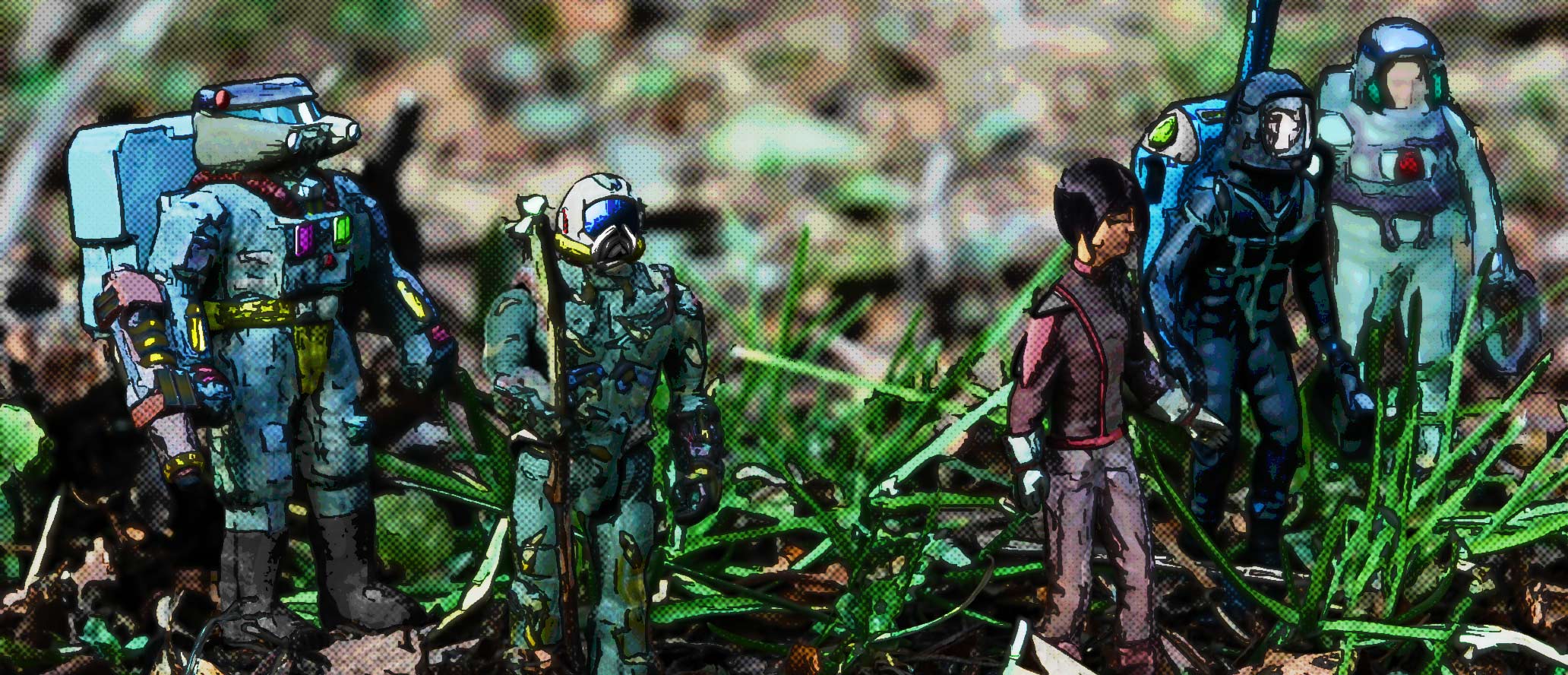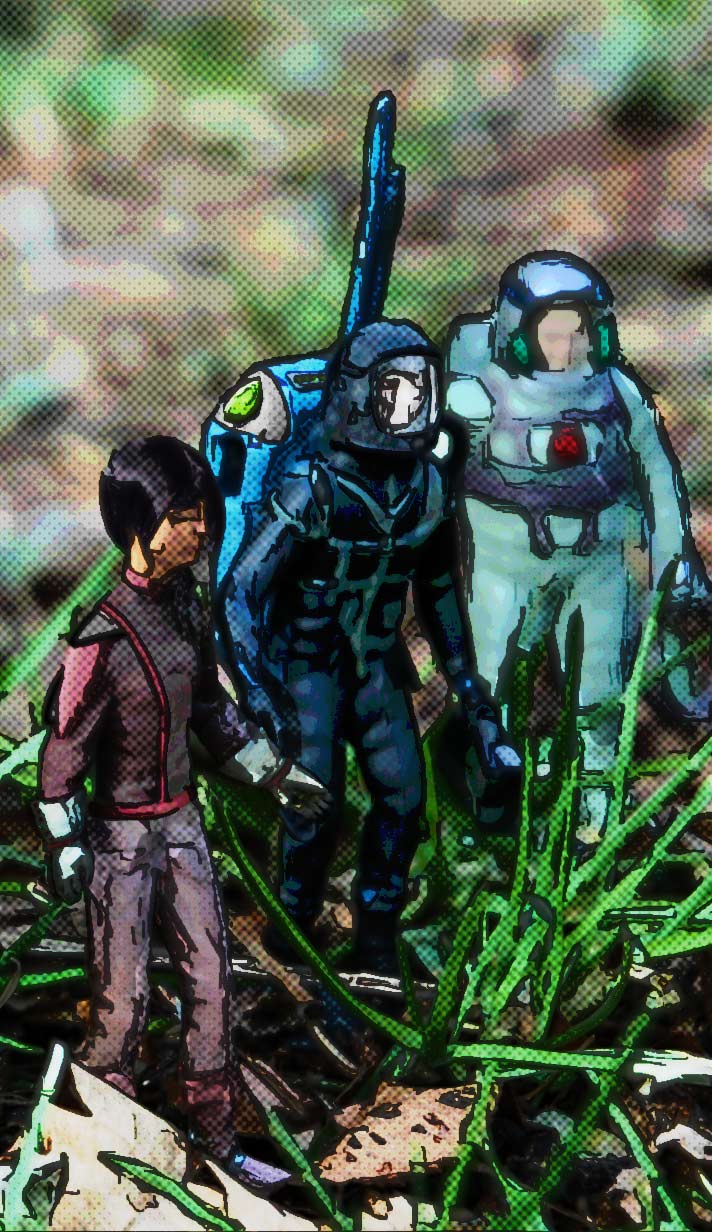SENTINELS
By Scot Noel
Illustrated by Jane Noel
|
 |
The things of his youth were there at the last, taking up station. The things of his youth remembered all they had been told. About the stars. About the beasts in the jungles of the night. About the land where the flowers of dawn would grow.
There were five. Four followers and one leader. Two of the followers took up positions near his boots. The others waited where his right hand had been. They waited with the patience of toys, waited with mixed understanding. They waited near the body while all about them the air trembled with light and the earth sounded to the voice of the deepest drums.
By nightfall the pounding subsided, followed for a time by silence. It became so still they could hear the passing of the river to the east. And still they waited. Above them rode a darkness unbroken by stars. The hours passed.
At dawn there came a half-twilight, followed by a hard rain.
Without saying a word, for they could say no words, the five sentinels began to move. The smallest of them stood at five and a half centimeters, the largest –the lithe female—at six. When grasses bowed and trees swayed, they required shelter. The four looked to the female, who gestured with a splayed hand, urging them back to the belt pouch from which they had emerged sometime past.
The climb across the body, though difficult, was accomplished with practiced ease. As practiced were the moves by which they entered the small, stiff pouch and pulled its cover tight, closing themselves in the little darkness.
The rain sounded as hard against the tiny shelter as the artillery had, burning up the sky. But inside, shoulder to shoulder, back to back, they knew they could not be separated, not washed away by the pounding torrents. Inside, at their feet, laid a small capsule of long-dried seeds, a singular possession given over to their trust.
A promise. Beside it rested an intricately folded device of a size easily carried by two of the sentinels. It collected sunlight, and would need to do so again, soon.
In the meantime, the rain washed the battlefield, and the rivers ran red.
|
Memory, always at a premium in forms so small, came in the way of dreams. Waking dreams, reflections of moments from the time they first looked out upon the world. Long ago, a company of their kind had stood for review on a mirrored table.
Great blue eyes reflected up from beneath their feet, and a thumb, as large as the largest of the sentinels, came together with its fellows, gentling them up into digits barely a decade old. In young hands, they found themselves examined and possessed.
They were gifts, holiday playthings, little figures smarter than they need be, but were. They had become the army of Daniel, and there were things to do.
They fought one another across expanses of open floor and mounted difficult campaigns in the freshly tilled soil of the gardens.
They explored beneath flowers whose heights rivaled the canopies of rain forests and faced down demons, fighting back creatures of many legs and hard shells. They broke through webs into dark places. Atop Daniel’s shoulders, they learned to watch the stars.
And they died. Or dwindled. Their numbers faded as the memories of dreams fade. Some were lost beneath snows, others swept up by small streams. Fire stole away a few, and the teeth of great beasts tore at others.
|
So it was that in the end they understood the passing of Daniel.
They themselves had been soldiers ordered into harms way. Some had been lucky, and some had not. Daniel himself wore a Celtic cross to bring him luck, but on this day, as opposed to all others, it had not helped.
After the rains, the leader moved her squad to higher ground. She did not need Daniel to tell her the capsule of seeds and the other sentinels must be kept safe, and a battlefield was no place to stay without protection. Though they would never have Daniel’s protection again, perhaps this was the land where the flowers of dawn would grow.
Using soft twigs and stolen spider silk, they fashioned two stretchers, one for the capsule of seeds and one for the solar device. Slow steps took them around rivulets and heaps of smoking metal. Bodies of Daniel’s kind lay close, all as broken as the great machines, and nowhere did they see a living man. In the distance the rattle of deep drums continued, but whether it was a storm or a continuation of the fight, they could not tell.
Earth and sky were filled with the hues of an English watercolor landscape, from the beginnings of color to the darkness of caves. The place was but a cousin to the blue skies of home, a border world where some conflict, great or small, had brought two armies head to head.
Now the thunder of weapons lay stilled, and the smallest things began to move, to stir among the smoking ruins with the songs of insects and the flutter of wings.
One of the sentinels bore a small painted symbol on its breast, once insignia red. There came a point, as they scaled a slope of mud and small stones, when the knees of the painted one buckled and its head bowed. The attention of the others fell to it. They remembered the paints and the fine brush by which Daniel had marked his favorites, and when the painted one fell, they knew what had to be done.
| A day came when Daniel’s favorite, the painted one, did not return from watch. They found him in a stance of alert vigilance, looking down over the slope of the hill below their tree-root base. He never did move again.
|
There was not much sun at first, only a quick ray or two breaking through a blanket of smoke, but still they stopped and unfolded the solar collector. It was fragile. In the time they took to lay it out across the slope, the favored sentinel grew weaker. The gold foil of the collector took up a large space, forcing them to defend it as best they could. The footfall of the smallest creature might tear the fabric. But while it gathered light, it was as water and food to them.
Over the course of an hour, the collector began to fill up the fallen sentinel and make it whole.
Ants harried the fragile collector. Ants the size of dogs (on the scale of the sentinels) ran wild over the foil. In their quick lightness of being the ants seemed unstoppable, and yet the sentinels tried. Using spider silk as garrotes, they strangled the worst of the intruders. They wrestled away the insects and waited for the painted one to revive. When it did, they each in turn paused to take a little sustenance from the solar collector themselves.
|
In the age before Daniel grew to manhood, one autumn afternoon, he sat before a table. The surface glowed softly. He spoke of things. To the sentinels arrayed before him, he spoke of the size of things, of how all the grains of sand were not enough to count the stars. He spoke of time. Of how beliefs as old as man were but a blink. By the heartbeat of the universe, he assured them, history was not yet worthy of a single pulse. So insubstantial is a thousand years.
It was all so big, and so long, and so far above, but the sentinels tried to understand.
|
 |
|
Once Daniel had saved, from each of the gardens they explored, a seed. A seed of this flower and a seed of that. They never knew the names, for even he did not know how to classify the great stems and petals, the colorful blossoms that weighed heavily above them. And these seeds, in days of young imagination, were their treasure, their reward for braving dark forests and facing down the web borne terrors and eyeless beasts of the burrowed soil.
With their treasure laid before them, on the glowing table, Daniel promised his sentinels that one day they would have their own world on which to plant the seeds. By that he meant no more than another garden, one he would build himself and through which the glory of his diminutive armies might pass.
In daydream only did the promised garden ever grow, and in time the capsule of seeds became a memory of youth, then a talisman of sorts, a bit of luck to accompany Daniel’s other treasured pieces.
They had the capsule with them when they stopped at the edge of the river. But of Daniel’s body they could find no trace, for the animals had come and the river, wounded by artillery, had wandered from its original course. Already grasses had begun to cover the scars of fire.
The sentinels came together on the quiet ground, to do honor and to mourn. They had had no hope of burying Daniel, but they could remember.
The leader broke open the capsule, giving it over to the others to spread the seed. And seed by seed, they gentled them beneath the warm ground. By the time the stars appeared overhead, they were done. Whether the seeds would grow or not was beyond knowing. In a way they had sewn the new land with the seeds of innocence, both to honor its passing and in a hope that it might grow again.
The things of his youth were there at the last, taking up station. The things of his youth remembered all they had been told. About the stars. About the beasts in the jungles of the night. About the land where the flowers of dawn would grow.
|